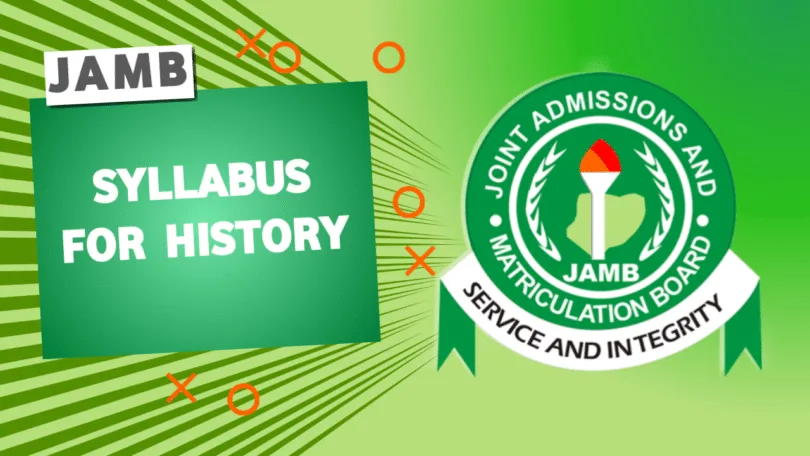Is History part of the subjects you registered in JAMB? If yes, here’s a guide on what to study for your next examination. The JAMB syllabus for History 2026/2027 aims to serve as a guide to prepare and test you knowledge of the subject.
JAMB History Syllabus Overview
| Title | Detail |
|---|---|
| Exam Type | UTME |
| Exam Session | 2026/2027 |
| Syllabus Subject | History |
| File Format | |
| File Size | 215KB |
READ ALSO: JAMB Recommended Textbooks For History 2026/2027
Why You Should Use The JAMB Syllabus for History
There are quite a number of reasons why you should use the JAMB syllabus to study for your next examination. You already have a lot to go through, so using the syllabus will;
- Keep your attention to studying what really matters in your examination
- Reduce your confusion i.e you’ll know what textbook chapters to focus on
- Help you know the areas you still need help so you sharpen your weaknesses before exams
- Help you track your progress topic by topic
Topics Covered in the Syllabus
- Land and Peoples of the Nigeria Area
- Early Centres of Civilization
- Origin and formation of States in the Nigeria Area
- Economic Activities and Growth of States
- External Influences
- The Sokoto Caliphate, The Sokoto Jihad
- Kanem-Borno
- Yorubaland
- Benin
- Nupe
- Igbo
- Efik
- European Penetration and Impact
- British Conquest of the Nigeria Area
- The Establishment of Colonial Rule up to 1914
- The Amalgamation of 1914
- Colonial Administration After the Amalgamation
- The Colonial Economy
- Social Development under Colonial Rule
- Nationalism, Constitutional Developments and Independence
- The politics of the First Republic and Military intervention
- The Civil War
- The Gowon Regime
- Murtala/Obasanjo Regime
- The Second Republic
- The Buhari Regime
- The Babangida Regime
- The Interim National Government (ING)
- The Abacha Regime
- Nigeria in International Organizations
- Islamic Reform Movements and State Building in West Africa
- Sierra Leone, Liberia and Christian Missionary Activities in West Africa
- Egypt under Mohammed Ali and Khedive Ismail
- The Mahdi and Mahdiyya Movement in the Sudan
- The Omani Empire
- Ethiopia in the 19th century
- The Mfecane
- The Great Trek
- The New Imperialism and European Occupation of Africa
- Patterns of Colonial Rule in Africa
- The Politics of Decolonization
- Apartheid in South Africa
- Problems of Nation-building in Africa
Full JAMB Syllabus for History 2026/2027
| Section | Topic / Theme | Contents / Sub-topics | Objectives |
|---|---|---|---|
| Section A | The Nigeria Area up to 1800 |
|
|
| Section B | The Nigeria Area 1800–1900 |
|
|
| Section C | Nigeria 1900–1960 |
|
|
| Section D | Nigeria 1960 to Present |
|
|
| Section E | Africa & the Wider World |
|
|
How To Download The JAMB History Syllabus 2026/2027
Follow the steps listed below if you want to download the JAMB History syllabus.
- To access the file, tap the download link on this page
- Save the PDF to your mobile phone or laptop so you can access it anytime, even without data
- The PDF makes it easier to plan for reading, organizing, and tracking your progress.
Best Ways to Use the JAMB Syllabus Effectively
- Break the syllabus into achievable goals. This can be done by dividing the topics into what you’ll be able to cover in weeks or in months
- Check topics that appear more often in past questions and leverage on that
- Use the syllabus to point out the topics you don’t know too well and focus on them
- Ensure you follow the syllabus chronologically so that you know if one topic flows into the next one
Conclusion
In conclusion, this syllabus serve as a guide to candidates who registered History as one of their UTME subjects. We recommend that they use the syllabus to make studying easier and less stressful.
Frequently Asked Questions on JAMB History Syllabus 2026
Is the JAMB Syllabus for History Compulsory?
Yes. The JAMB History Syllabus is compulsory if you want your studies to be worthwhile. You need to ensure you are on the right track, and that is what the syllabus is offering.
Can I Download The JAMB History Syllabus for Free
Yes, you can. The JAMB History Syllabus can be downloaded for free right here on the website.
Does JAMB Syllabus Changes Every Year?
Not exactly. Sometimes, it changes and sometimes, it doesn’t. You need to ensure that you are up to date to know whichever one they are using currently.
How Many Questions Come From History in JAMB?
Usually 40 questions
Where Can I Get The Official JAMB History Syllabus 2026?
You can get the Official JAMB History Syllabus for 2026 here





